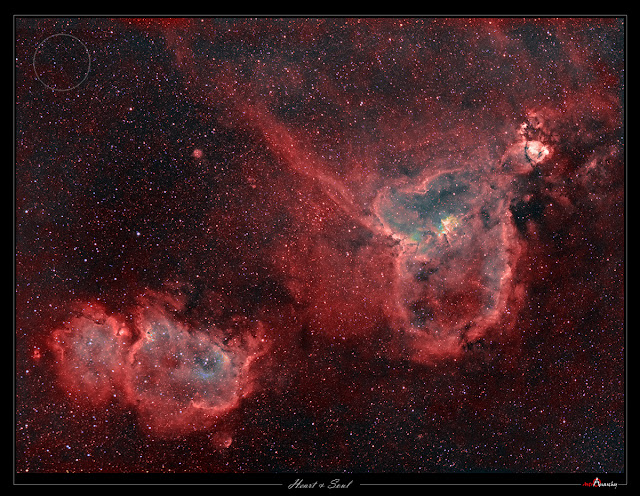COPYRIGHT, PLEASE NOTE
All the material on this website is copyrighted to J-P Metsavainio, if not otherwise stated. Any content on this website may not be reproduced without the author’s permission.
BUY A MUSEUM QUALITY POSTER
BUY A POSTER:https://astroanarchy.zenfolio.com/
Tuesday, January 14, 2020
Deep look to the Heart
I made some testing with my new imaging system based on Tokina AT-x 300mm f2.8 camera lens.
The CCD I'm using has kind of large pixels, 9 microns, so I'm undersampled, the image scale is almost 5 arc seconds / pixel. Undersampling is not a bad thing when my targets are large and dim nebula complexes. This system collects photons very fast!
The CCD I'm using has kind of large pixels, 9 microns, so I'm undersampled, the image scale is almost 5 arc seconds / pixel. Undersampling is not a bad thing when my targets are large and dim nebula complexes. This system collects photons very fast!
I selected the Heart Nebula as a target since I have plenty of reference material for it. Another reason is interesting and rarely imaged area after the bright tip of the heart. There are some remnants of a supernova explosion. I was really thrilled, when I saw the final stack of 12 600s H-alpha light frames. (Equal to 2h of exposures) I never have seen so much background nebulae and details from this popular target.
Beside 2h of H-alpha (Light from an ionized hydrogen) I shot 30 min of O-IIII (Light from an ionized Oxygen) To be able to make an image in visual palette.
The Heart Nebula, IC 1805
Please, click for a large image
Going very deep just in two hours! Image is in visual color palette from emission of an ionized hydrogen and oxygen. R=hydrogen, G=Oxygen and B=oxygen. I have made a starless version out of this image, it can be seen here, https://astroanarchy.blogspot.com/2020/01/an-animated-heart-nebula-ic1805805-with.html
An older image of the area from 2011

Note, there is a white circle showing an apparent size of the Moon at upper left corner to show the scale in the sky. More info about this older image can be seen here, https://astroanarchy.blogspot.com/2011/05/wide-field-vs-closeups-north-america_21.html
Technical details
Processing workflow
Image acquisition, MaxiDL v5.07.
Stacked and calibrated in CCDStack2.
Deconvolution with a CCDStack2 Positive Constraint, 33 iterations, added at 50% weight
Color combine in PS CS3
Levels and curves in PS CS3.
Imaging optics
Tokina AT-x 300mm f2.8 camera lens
Mount
10-micron 1000
Cameras and filters
Imaging camera Apogee Alta U16 and Apogee seven slot filter wheel
Guider camera, Lodestar x 2 and an old spotting scope of Meade LX200
Astrodon filters,
5nm H-alpha 3nm S-II and 3nm O-III
5nm H-alpha 3nm S-II and 3nm O-III
Total exposure time
H-alpha, 12 x 600 s, binned 1x1 = 2 h
O-III, 3x 600 s, binned 1x1 = 30 min..
O-III, 3x 600 s, binned 1x1 = 30 min..
Subscribe to:
Post Comments (Atom)










No comments:
Post a Comment